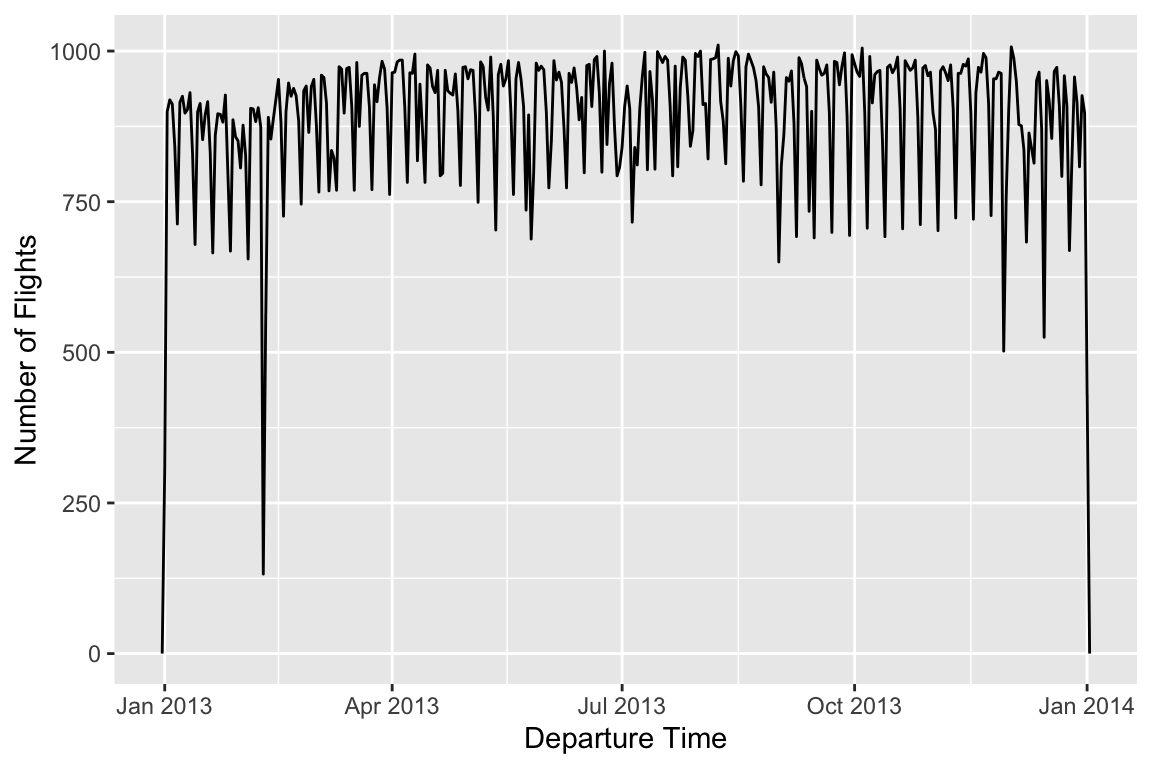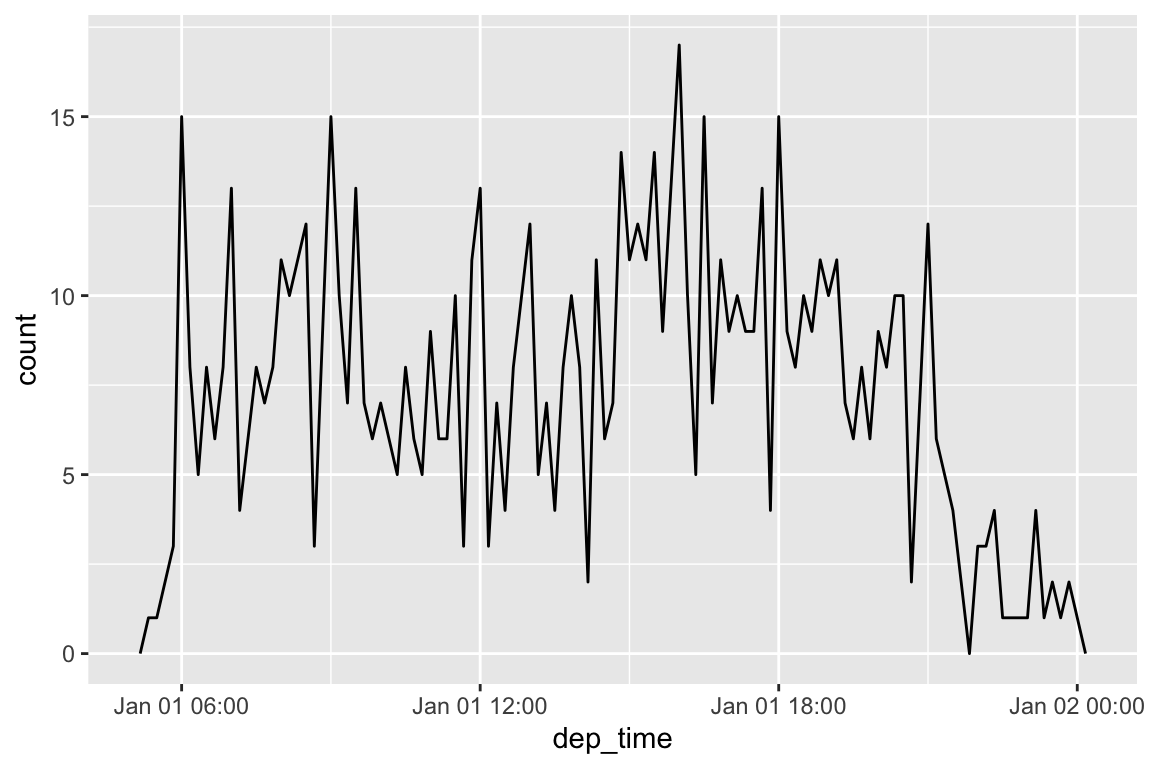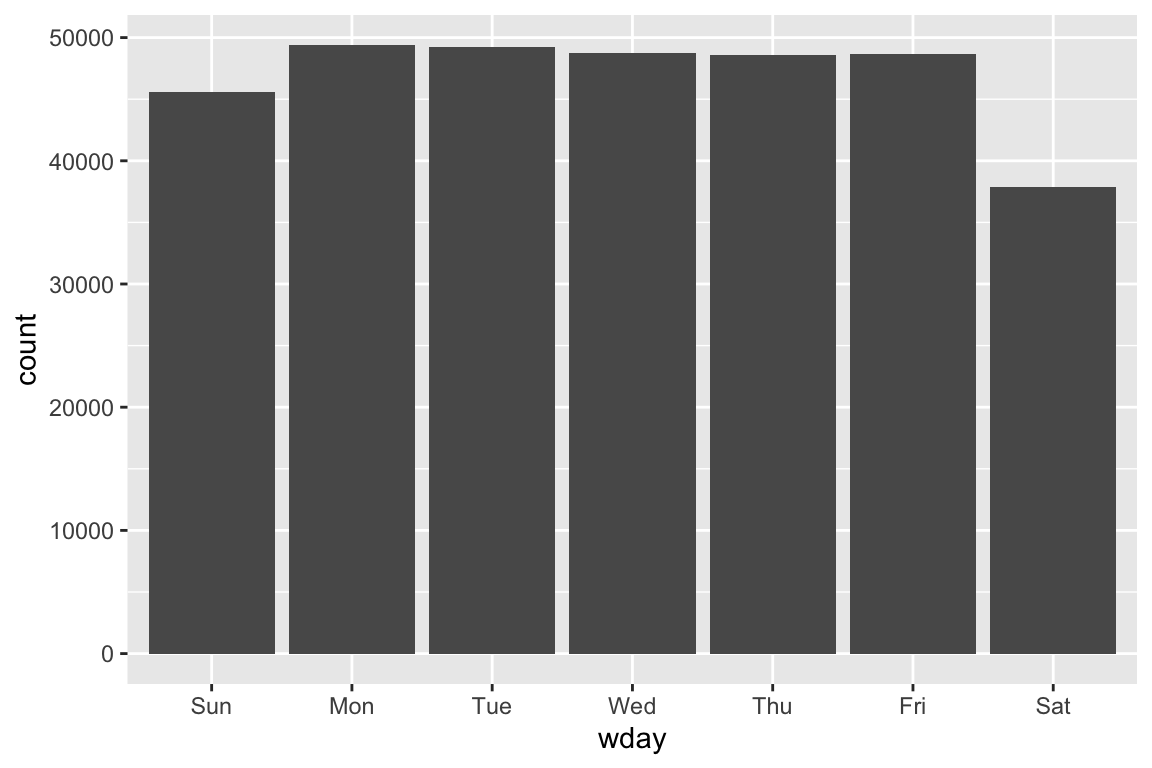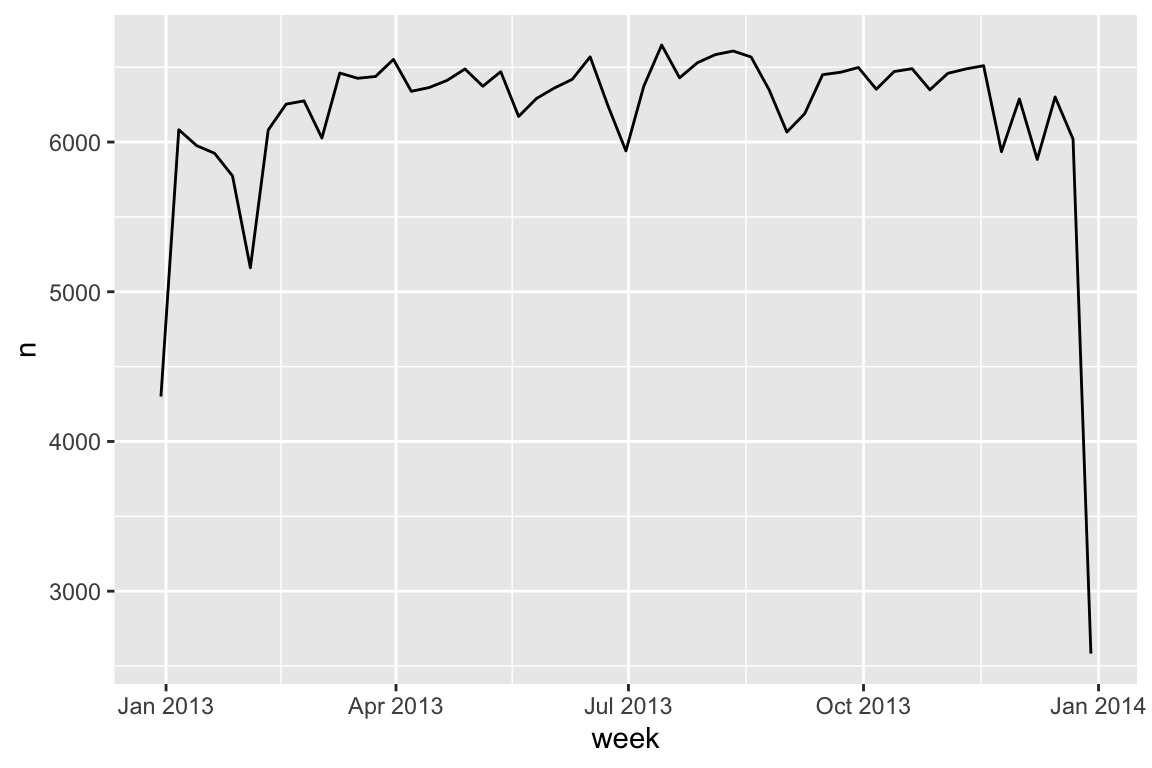Display machine information for reproducibility.
R version 4.2.2 (2022-10-31)
Platform: x86_64-apple-darwin17.0 (64-bit)
Running under: macOS Big Sur ... 10.16
Matrix products: default
BLAS: /Library/Frameworks/R.framework/Versions/4.2/Resources/lib/libRblas.0.dylib
LAPACK: /Library/Frameworks/R.framework/Versions/4.2/Resources/lib/libRlapack.dylib
locale:
[1] en_US.UTF-8/en_US.UTF-8/en_US.UTF-8/C/en_US.UTF-8/en_US.UTF-8
attached base packages:
[1] stats graphics grDevices utils datasets methods base
other attached packages:
[1] nycflights13_1.0.2 lubridate_1.9.0 timechange_0.1.1 forcats_0.5.2
[5] stringr_1.5.0 dplyr_1.0.10 purrr_1.0.0 readr_2.1.3
[9] tidyr_1.2.1 tibble_3.1.8 ggplot2_3.4.0 tidyverse_1.3.2
loaded via a namespace (and not attached):
[1] tidyselect_1.2.0 xfun_0.35 haven_2.5.1
[4] gargle_1.2.1 colorspace_2.0-3 vctrs_0.5.1
[7] generics_0.1.3 htmltools_0.5.4 yaml_2.3.6
[10] utf8_1.2.2 rlang_1.0.6 pillar_1.8.1
[13] withr_2.5.0 glue_1.6.2 DBI_1.1.3
[16] dbplyr_2.2.1 modelr_0.1.10 readxl_1.4.1
[19] lifecycle_1.0.3 munsell_0.5.0 gtable_0.3.1
[22] cellranger_1.1.0 rvest_1.0.3 htmlwidgets_1.6.0
[25] evaluate_0.18 knitr_1.41 tzdb_0.3.0
[28] fastmap_1.1.0 fansi_1.0.3 broom_1.0.2
[31] backports_1.4.1 scales_1.2.1 googlesheets4_1.0.1
[34] jsonlite_1.8.4 fs_1.5.2 hms_1.1.2
[37] digest_0.6.30 stringi_1.7.8 grid_4.2.2
[40] cli_3.4.1 tools_4.2.2 magrittr_2.0.3
[43] crayon_1.5.2 pkgconfig_2.0.3 ellipsis_0.3.2
[46] xml2_1.3.3 reprex_2.0.2 googledrive_2.0.0
[49] assertthat_0.2.1 rmarkdown_2.18 httr_1.4.4
[52] rstudioapi_0.14 R6_2.5.1 compiler_4.2.2
import IPythonprint (IPython.sys_info())
{'commit_hash': 'add5877a4',
'commit_source': 'installation',
'default_encoding': 'utf-8',
'ipython_path': '/Library/Frameworks/Python.framework/Versions/3.10/lib/python3.10/site-packages/IPython',
'ipython_version': '8.8.0',
'os_name': 'posix',
'platform': 'macOS-10.16-x86_64-i386-64bit',
'sys_executable': '/Library/Frameworks/Python.framework/Versions/3.10/bin/python3',
'sys_platform': 'darwin',
'sys_version': '3.10.9 (v3.10.9:1dd9be6584, Dec 6 2022, 14:37:36) [Clang '
'13.0.0 (clang-1300.0.29.30)]'}
using InteractiveUtils versioninfo ()
Julia Version 1.8.3
Commit 0434deb161e (2022-11-14 20:14 UTC)
Platform Info:
OS: macOS (x86_64-apple-darwin21.4.0)
CPU: 8 × Intel(R) Core(TM) i7-6920HQ CPU @ 2.90GHz
WORD_SIZE: 64
LIBM: libopenlibm
LLVM: libLLVM-13.0.1 (ORCJIT, skylake)
Threads: 1 on 8 virtual cores
Environment:
DYLD_FALLBACK_LIBRARY_PATH = /Library/Frameworks/R.framework/Resources/lib:/Library/Java/JavaVirtualMachines/jdk1.8.0_241.jdk/Contents/Home/jre/lib/server
JULIA_EDITOR = code
Load tidyverse and lubridate (R), Pandas (Python), and DataFrames.jl (Julia).
library (lubridate)library (nycflights13)library (tidyverse)
# Load the pandas library import pandas as pd# Load numpy for array manipulation import numpy as np
using DataFrames , Pipe , StatsBase
Basics
Three types of data/time data:
date . Tibbles print it as <date>.time . Tibbles print it as <time>.date-time . Tibbles print it as <dttm>.
In the flights tibble, the last variable time_hour is in the data-time format:
%>% print (width = Inf )
# A tibble: 336,776 × 19
year month day dep_time sched_dep_time dep_delay arr_time sched_arr_time
<int> <int> <int> <int> <int> <dbl> <int> <int>
1 2013 1 1 517 515 2 830 819
2 2013 1 1 533 529 4 850 830
3 2013 1 1 542 540 2 923 850
4 2013 1 1 544 545 -1 1004 1022
5 2013 1 1 554 600 -6 812 837
6 2013 1 1 554 558 -4 740 728
7 2013 1 1 555 600 -5 913 854
8 2013 1 1 557 600 -3 709 723
9 2013 1 1 557 600 -3 838 846
10 2013 1 1 558 600 -2 753 745
arr_delay carrier flight tailnum origin dest air_time distance hour minute
<dbl> <chr> <int> <chr> <chr> <chr> <dbl> <dbl> <dbl> <dbl>
1 11 UA 1545 N14228 EWR IAH 227 1400 5 15
2 20 UA 1714 N24211 LGA IAH 227 1416 5 29
3 33 AA 1141 N619AA JFK MIA 160 1089 5 40
4 -18 B6 725 N804JB JFK BQN 183 1576 5 45
5 -25 DL 461 N668DN LGA ATL 116 762 6 0
6 12 UA 1696 N39463 EWR ORD 150 719 5 58
7 19 B6 507 N516JB EWR FLL 158 1065 6 0
8 -14 EV 5708 N829AS LGA IAD 53 229 6 0
9 -8 B6 79 N593JB JFK MCO 140 944 6 0
10 8 AA 301 N3ALAA LGA ORD 138 733 6 0
time_hour
<dttm>
1 2013-01-01 05:00:00
2 2013-01-01 05:00:00
3 2013-01-01 05:00:00
4 2013-01-01 05:00:00
5 2013-01-01 06:00:00
6 2013-01-01 05:00:00
7 2013-01-01 06:00:00
8 2013-01-01 06:00:00
9 2013-01-01 06:00:00
10 2013-01-01 06:00:00
# … with 336,766 more rows
The nycflights13 data is available from the nycflights13 package in Python.
from nycflights13 import flights
year month day ... hour minute time_hour
0 2013 1 1 ... 5 15 2013-01-01T10:00:00Z
1 2013 1 1 ... 5 29 2013-01-01T10:00:00Z
2 2013 1 1 ... 5 40 2013-01-01T10:00:00Z
3 2013 1 1 ... 5 45 2013-01-01T10:00:00Z
4 2013 1 1 ... 6 0 2013-01-01T11:00:00Z
... ... ... ... ... ... ... ...
336771 2013 9 30 ... 14 55 2013-09-30T18:00:00Z
336772 2013 9 30 ... 22 0 2013-10-01T02:00:00Z
336773 2013 9 30 ... 12 10 2013-09-30T16:00:00Z
336774 2013 9 30 ... 11 59 2013-09-30T15:00:00Z
336775 2013 9 30 ... 8 40 2013-09-30T12:00:00Z
[336776 rows x 19 columns]
Note there are some differences of this flights data from that in tidyverse. The data types for some variables are different. There are no natural ways in Pandas to hold integer column with missing values; so dep_time , arr_time are float64 instead of int64.
<class 'pandas.core.frame.DataFrame'>
RangeIndex: 336776 entries, 0 to 336775
Data columns (total 19 columns):
# Column Non-Null Count Dtype
--- ------ -------------- -----
0 year 336776 non-null int64
1 month 336776 non-null int64
2 day 336776 non-null int64
3 dep_time 328521 non-null float64
4 sched_dep_time 336776 non-null int64
5 dep_delay 328521 non-null float64
6 arr_time 328063 non-null float64
7 sched_arr_time 336776 non-null int64
8 arr_delay 327346 non-null float64
9 carrier 336776 non-null object
10 flight 336776 non-null int64
11 tailnum 334264 non-null object
12 origin 336776 non-null object
13 dest 336776 non-null object
14 air_time 327346 non-null float64
15 distance 336776 non-null int64
16 hour 336776 non-null int64
17 minute 336776 non-null int64
18 time_hour 336776 non-null object
dtypes: float64(5), int64(9), object(5)
memory usage: 48.8+ MB
To be more consistent with nycflights13 in tidyverse, we cast time_hour to datetime type.
'time_hour' ] = pd.to_datetime(flights['time_hour' ])
Let’s use RCall.jl to retrieve the nycflights13 data from R.
using RCall """ library(nycflights13) """ = rcopy (R"flights" )
336776×19 DataFrame
Row │ year month day dep_time sched_dep_time dep_delay arr_time ⋯
│ Int64 Int64 Int64 Int64? Int64 Float64? Int64? ⋯
────────┼───────────────────────────────────────────────────────────────────────
1 │ 2013 1 1 517 515 2.0 830 ⋯
2 │ 2013 1 1 533 529 4.0 850
3 │ 2013 1 1 542 540 2.0 923
4 │ 2013 1 1 544 545 -1.0 1004
5 │ 2013 1 1 554 600 -6.0 812 ⋯
6 │ 2013 1 1 554 558 -4.0 740
7 │ 2013 1 1 555 600 -5.0 913
8 │ 2013 1 1 557 600 -3.0 709
⋮ │ ⋮ ⋮ ⋮ ⋮ ⋮ ⋮ ⋮ ⋱
336770 │ 2013 9 30 2349 2359 -10.0 325 ⋯
336771 │ 2013 9 30 missing 1842 missing missing
336772 │ 2013 9 30 missing 1455 missing missing
336773 │ 2013 9 30 missing 2200 missing missing
336774 │ 2013 9 30 missing 1210 missing missing ⋯
336775 │ 2013 9 30 missing 1159 missing missing
336776 │ 2013 9 30 missing 840 missing missing
12 columns and 336761 rows omitted
Create date/times
today and now
Today:
# current date-time now ()
[1] "2023-02-01 09:17:27 PST"
Today:
from datetime import date, datetime# Current date # Current date-time
datetime.date(2023, 2, 1)
datetime.datetime(2023, 2, 1, 17, 12, 30, 320526)
using Dates # Current date today ()# Current date-time now ()
From strings
ymd_hms ("2023-02-02 14:57:25" )
[1] "2023-02-02 14:57:25 UTC"
ymd_hm ("2023-02-02 14:57" )
[1] "2023-02-02 14:57:00 UTC"
from dateutil.parser import parse'2023-02-02' , '%Y-%m- %d ' ).date()# I have to use the package python-dateutils to parse Feb 2nd
datetime.date(2023, 2, 2)
'Feb 2nd, 2023' ).date()
datetime.date(2023, 2, 2)
'02-Feb-2023' , ' %d -%b-%Y' ).date()
datetime.date(2023, 2, 2)
'2023-02-02 14:57:25' , '%Y-%m- %d %H:%M:%S' )
datetime.datetime(2023, 2, 2, 14, 57, 25)
'2023-02-02 14:57' , '%Y-%m- %d %H:%M' )
datetime.datetime(2023, 2, 2, 14, 57)
Date ("2023-02-02" , dateformat"y-m-d" )# Not sure how to parse "Feb 2nd, 2023" ??? # Date("Feb 2nd, 2023", dateformat"u d, y") Date ("02-Feb-2023" , dateformat"d-u-y" )
DateTime ("2023-02-02 14:57:25" , dateformat"y-m-d H:M:S" )DateTime ("2023-02-02 14:57" , dateformat"y-m-d H:M" )
From unquoated numbers
2022 , 2 , 2 ).date()
datetime.date(2022, 2, 2)
From variables/columns in a tibble
%>% select (year, month, day, hour, minute) %>% mutate (departure = make_datetime (year, month, day, hour, minute))
# A tibble: 336,776 × 6
year month day hour minute departure
<int> <int> <int> <dbl> <dbl> <dttm>
1 2013 1 1 5 15 2013-01-01 05:15:00
2 2013 1 1 5 29 2013-01-01 05:29:00
3 2013 1 1 5 40 2013-01-01 05:40:00
4 2013 1 1 5 45 2013-01-01 05:45:00
5 2013 1 1 6 0 2013-01-01 06:00:00
6 2013 1 1 5 58 2013-01-01 05:58:00
7 2013 1 1 6 0 2013-01-01 06:00:00
8 2013 1 1 6 0 2013-01-01 06:00:00
9 2013 1 1 6 0 2013-01-01 06:00:00
10 2013 1 1 6 0 2013-01-01 06:00:00
# … with 336,766 more rows
<- function (year, month, day, time) {make_datetime (year, month, day, time %/% 100 , time %% 100 )<- flights %>% filter (! is.na (dep_time), ! is.na (arr_time)) %>% mutate (dep_time = make_datetime_100 (year, month, day, dep_time),arr_time = make_datetime_100 (year, month, day, arr_time),sched_dep_time = make_datetime_100 (year, month, day, sched_dep_time),sched_arr_time = make_datetime_100 (year, month, day, sched_arr_time)%>% select (origin, dest, ends_with ("delay" ), ends_with ("time" )) %>% print (width = Inf )
# A tibble: 328,063 × 9
origin dest dep_delay arr_delay dep_time sched_dep_time
<chr> <chr> <dbl> <dbl> <dttm> <dttm>
1 EWR IAH 2 11 2013-01-01 05:17:00 2013-01-01 05:15:00
2 LGA IAH 4 20 2013-01-01 05:33:00 2013-01-01 05:29:00
3 JFK MIA 2 33 2013-01-01 05:42:00 2013-01-01 05:40:00
4 JFK BQN -1 -18 2013-01-01 05:44:00 2013-01-01 05:45:00
5 LGA ATL -6 -25 2013-01-01 05:54:00 2013-01-01 06:00:00
6 EWR ORD -4 12 2013-01-01 05:54:00 2013-01-01 05:58:00
7 EWR FLL -5 19 2013-01-01 05:55:00 2013-01-01 06:00:00
8 LGA IAD -3 -14 2013-01-01 05:57:00 2013-01-01 06:00:00
9 JFK MCO -3 -8 2013-01-01 05:57:00 2013-01-01 06:00:00
10 LGA ORD -2 8 2013-01-01 05:58:00 2013-01-01 06:00:00
arr_time sched_arr_time air_time
<dttm> <dttm> <dbl>
1 2013-01-01 08:30:00 2013-01-01 08:19:00 227
2 2013-01-01 08:50:00 2013-01-01 08:30:00 227
3 2013-01-01 09:23:00 2013-01-01 08:50:00 160
4 2013-01-01 10:04:00 2013-01-01 10:22:00 183
5 2013-01-01 08:12:00 2013-01-01 08:37:00 116
6 2013-01-01 07:40:00 2013-01-01 07:28:00 150
7 2013-01-01 09:13:00 2013-01-01 08:54:00 158
8 2013-01-01 07:09:00 2013-01-01 07:23:00 53
9 2013-01-01 08:38:00 2013-01-01 08:46:00 140
10 2013-01-01 07:53:00 2013-01-01 07:45:00 138
# … with 328,053 more rows
Now we can visualize the distribution of departure times across the year
%>% ggplot (aes (x= dep_time)) + geom_freqpoly (binwidth = 86400 ) + # 86400 seconds = 1 day labs (x = "Departure Time" ,y = "Number of Flights"
or within a single day:
%>% filter (dep_time < ymd (20130102 )) %>% ggplot (aes (dep_time)) + geom_freqpoly (binwidth = 600 ) # 600 s = 10 minutes
Getting components
<- ymd_hms ("2023-02-02 15:34:56" )year (datetime)
More information in month() and wday():
month (datetime, label = TRUE , abbr = FALSE )
[1] January
12 Levels: January < February < March < April < May < June < ... < December
wday (datetime, label = TRUE , abbr = FALSE )
[1] Thursday
7 Levels: Sunday < Monday < Tuesday < Wednesday < Thursday < ... < Saturday
Visualize number of departures during a week:
%>% mutate (wday = wday (dep_time, label = TRUE )) %>% ggplot (aes (x = wday)) + geom_bar ()
Rounding
floor_date(), round_date(), ceiling_date():
%>% count (week = floor_date (dep_time, "week" )) %>% ggplot (aes (x = week, y = n)) + geom_line ()
Time spans
Durations
Substract two dates we get a difftime object:
# How old is Hadley? <- today () - ymd (19791014 )
Time difference of 15816 days
lubridate provides the duration object that always uses seconds:
[1] "1366502400s (~43.3 years)"
Constructors for duration:
[1] "43200s (~12 hours)" "86400s (~1 days)"
[1] "0s" "86400s (~1 days)" "172800s (~2 days)"
[4] "259200s (~3 days)" "345600s (~4 days)" "432000s (~5 days)"
[1] "1814400s (~3 weeks)"
[1] "31557600s (~1 years)"
Periods
Durations represent an exact number of seconds:
<- ymd_hms ("2016-03-12 13:00:00" , tz = "America/New_York" )
[1] "2016-03-12 13:00:00 EST"
[1] "2016-03-13 14:00:00 EDT"
Periods are time spans but don’t have a fixed length in seconds, instead they work with “human” times, like days and months.
[1] "2016-03-12 13:00:00 EST"
[1] "2016-03-13 13:00:00 EDT"
Constructors for period:
[1] "12H 0M 0S" "24H 0M 0S"
[1] "1m 0d 0H 0M 0S" "2m 0d 0H 0M 0S" "3m 0d 0H 0M 0S" "4m 0d 0H 0M 0S"
[5] "5m 0d 0H 0M 0S" "6m 0d 0H 0M 0S"
Some planes appear to have arrived at their destination before they departed from New York City.
%>% filter (arr_time < dep_time) %>% print (width = Inf )
# A tibble: 10,640 × 9
origin dest dep_delay arr_delay dep_time sched_dep_time
<chr> <chr> <dbl> <dbl> <dttm> <dttm>
1 EWR BQN 9 -4 2013-01-01 19:29:00 2013-01-01 19:20:00
2 JFK DFW 59 NA 2013-01-01 19:39:00 2013-01-01 18:40:00
3 EWR TPA -2 9 2013-01-01 20:58:00 2013-01-01 21:00:00
4 EWR SJU -6 -12 2013-01-01 21:02:00 2013-01-01 21:08:00
5 EWR SFO 11 -14 2013-01-01 21:08:00 2013-01-01 20:57:00
6 LGA FLL -10 -2 2013-01-01 21:20:00 2013-01-01 21:30:00
7 EWR MCO 41 43 2013-01-01 21:21:00 2013-01-01 20:40:00
8 JFK LAX -7 -24 2013-01-01 21:28:00 2013-01-01 21:35:00
9 EWR FLL 49 28 2013-01-01 21:34:00 2013-01-01 20:45:00
10 EWR FLL -9 -14 2013-01-01 21:36:00 2013-01-01 21:45:00
arr_time sched_arr_time air_time
<dttm> <dttm> <dbl>
1 2013-01-01 00:03:00 2013-01-01 00:07:00 192
2 2013-01-01 00:29:00 2013-01-01 21:51:00 NA
3 2013-01-01 00:08:00 2013-01-01 23:59:00 159
4 2013-01-01 01:46:00 2013-01-01 01:58:00 199
5 2013-01-01 00:25:00 2013-01-01 00:39:00 354
6 2013-01-01 00:16:00 2013-01-01 00:18:00 160
7 2013-01-01 00:06:00 2013-01-01 23:23:00 143
8 2013-01-01 00:26:00 2013-01-01 00:50:00 338
9 2013-01-01 00:20:00 2013-01-01 23:52:00 152
10 2013-01-01 00:25:00 2013-01-01 00:39:00 154
# … with 10,630 more rows
These are the overnight flights. Let’s fix this:
<- flights_dt %>% mutate (overnight = arr_time < dep_time,arr_time = arr_time + days (overnight * 1 ),sched_arr_time = sched_arr_time + days (overnight * 1 )%>% print (width = Inf )
# A tibble: 328,063 × 10
origin dest dep_delay arr_delay dep_time sched_dep_time
<chr> <chr> <dbl> <dbl> <dttm> <dttm>
1 EWR IAH 2 11 2013-01-01 05:17:00 2013-01-01 05:15:00
2 LGA IAH 4 20 2013-01-01 05:33:00 2013-01-01 05:29:00
3 JFK MIA 2 33 2013-01-01 05:42:00 2013-01-01 05:40:00
4 JFK BQN -1 -18 2013-01-01 05:44:00 2013-01-01 05:45:00
5 LGA ATL -6 -25 2013-01-01 05:54:00 2013-01-01 06:00:00
6 EWR ORD -4 12 2013-01-01 05:54:00 2013-01-01 05:58:00
7 EWR FLL -5 19 2013-01-01 05:55:00 2013-01-01 06:00:00
8 LGA IAD -3 -14 2013-01-01 05:57:00 2013-01-01 06:00:00
9 JFK MCO -3 -8 2013-01-01 05:57:00 2013-01-01 06:00:00
10 LGA ORD -2 8 2013-01-01 05:58:00 2013-01-01 06:00:00
arr_time sched_arr_time air_time overnight
<dttm> <dttm> <dbl> <lgl>
1 2013-01-01 08:30:00 2013-01-01 08:19:00 227 FALSE
2 2013-01-01 08:50:00 2013-01-01 08:30:00 227 FALSE
3 2013-01-01 09:23:00 2013-01-01 08:50:00 160 FALSE
4 2013-01-01 10:04:00 2013-01-01 10:22:00 183 FALSE
5 2013-01-01 08:12:00 2013-01-01 08:37:00 116 FALSE
6 2013-01-01 07:40:00 2013-01-01 07:28:00 150 FALSE
7 2013-01-01 09:13:00 2013-01-01 08:54:00 158 FALSE
8 2013-01-01 07:09:00 2013-01-01 07:23:00 53 FALSE
9 2013-01-01 08:38:00 2013-01-01 08:46:00 140 FALSE
10 2013-01-01 07:53:00 2013-01-01 07:45:00 138 FALSE
# … with 328,053 more rows
Intervals
Intervals are time spans bound by two real date-times. Intervals can be accurately converted to periods and durations.
interval (ymd_hms ("2009-08-09 13:01:30" ), ymd_hms ("2009-08-09 12:00:00" ))
[1] 2009-08-09 13:01:30 UTC--2009-08-09 12:00:00 UTC
<- ymd_hms ("2009-03-08 01:59:59" ) # DST boundary <- ymd_hms ("2000-02-29 12:00:00" )<- date2 %--% dateas.duration (span)
[1] "284651999s (~9.02 years)"
[1] "9y 0m 7d 13H 59M 59S"



